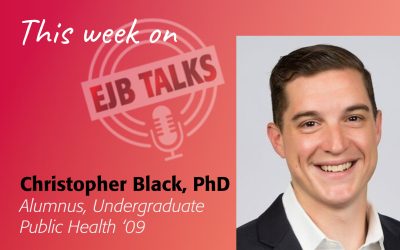The battle against COVID-19 has required a society-wide response. One of the key underappreciated components of that response has been the people who keep our hospitals running. In this episode, our host Stuart Shapiro, Associate Dean of Faculty and Professor of Policy at the Bloustein School, talks with Associate Professor of Practice Ann Marie-Hill, from the school’s health administration program about the role that health administrators play in the COVID-19 response.
Stuart Shapiro
Hello, and welcome to EJB Talks: Rutgers Bloustein Experts in Policy, Planning, and Health. I’m Stuart Shapiro, the Associate Dean of Faculty here at the Bloustein School, and the purpose of this podcast is to talk with my faculty colleagues about issues affecting people in New Jersey, the United States and the world.
Right now, like everyone else, many of us are focused on the COVID-19 virus and its impacts across the healthcare sector, across population health, and across the economy. So our first few episodes will certainly be on that subject.
Today, I’m very lucky to be talking with Professor Ann Marie Hill from our health administration program. Ann Marie, thanks for taking a few minutes to speak with us this morning.
Ann Marie Hill
My pleasure, Stuart.
Stuart Shapiro
Can you tell us a little bit about yourself and your background in healthcare administration and healthcare generally?
Ann Marie Hill
Sure. I’m an associate professor of practice here at the Bloustein School, which means I’ve spent a large part of my life actually in the field. I teach leadership, internship, and professional development, as well as marketing and strategic planning in the classroom. I also handle and am the lead for most of the internships that we place our students into.
But my history really is in the cancer field. I was, for most of my 27 years of work in that field, the executive director of the New Jersey Commission on Cancer Research. That position allowed me broad access and working relationships with many of the different areas we have in the field, from the pharmaceutical industry to hospitals, physician groups, and nurses, as well as nonprofits, advocacy groups, and insurers. So I have a lot of experience in health administration and in the field in general.
Stuart Shapiro
Wonderful. This is obviously a time unlike anything we have experienced. Speaking as a citizen, it’s remarkably different than anything I’ve seen. I can only imagine how different it is inside hospitals. Can you talk a little bit about what changes the past month has brought to the life of administrators and others that work in hospitals?
Ann Marie Hill
Well, as we teach our students, the only constant we have in healthcare is, actually, change. But I don’t think we’ve ever realized the type of sweeping and severe change that COVID-19 has brought us. It’s literally put the world on a different axis. And I don’t think people realize the extent to what it means to our healthcare system and how many adaptations and changes we’ve had to make. We literally have had to shift gears in a very short time from our regular work fields or tasks to an entirely new way of functioning. It’s 24/7 right now for our health administrators, our health workers, our doctors, and physicians. Everybody’s working non-stop and with very sick patients. And so that really has been a challenge.
We face limited beds, limited resources; our healthcare workers don’t have the protections that they actually need in terms of their equipment. And we’ve heard much about this. They’re putting their lives on the line. Health administrators are doing that every day as they manage hospitals and work in the care field. But I will say this–the health care system, particularly the one in New Jersey/New York area where we face so many challenges, it’s going to persevere. I think that we have incredible people. We have incredible leaders, including our health administrators, and we’re going to make this happen and overcome this problem.
Stuart Shapiro
So I think most people understand intuitively what a doctor does, what a nurse does. But if you tell people, oh, I’m a health administrator, or my kid is a health administrator, that is not something that is intuitive to them. Can you tell us a little bit about what we teach our students in the Master’s of Health Administration program and to our undergraduates majoring in Health Administration, and what kind of jobs and careers we’re preparing them for?
Ann Marie Hill
Absolutely. So healthcare is an extremely diverse field with a lot of challenges and opportunities. I call it “business with a heart” because health administrators are really the managers of our health care system. They make sure everything functions and works well so our patients get the best quality care possible. It’s an exciting field for our students in that it’s one of the top three fastest-growing fields in the country, along with finance, IT, and engineering. And it has about an 18% growth rate for jobs, and they pay very well. Most of them are paying–in fact, the average medium pay is I believe–$100,000 after five years of work in the field, nationally. And in New Jersey, it’s much higher than that. So it’s a great field for students.
Our programs–and we have two in health administration–we have our undergraduate program, which gives a really good comprehensive foundation of the skills that the students are going to need to assure that they’re successful. And our master’s of health administration is a newer program. It’s really a deeper dive into the type of management skills and healthcare knowledge that you need, and we are aiming in that program to grow healthcare leaders of the future.
Stuart Shapiro
And these are people that are going to be running hospitals, making sure that as you mentioned earlier, you know, with the shortage of beds, that supplies are coming in when they need to come in. They’re the ones handling all of those things that keep hospitals running. Is that right?
Ann Marie Hill
Yes, it’s been a challenging time with COVID because we’ve had a lot of disruptions in the system and we’ve had to shift the way we think about the problems of getting patients the best care. So supplies have been disrupted. They’re not getting the types of equipment. We’ve heard about the protective equipment that our direct caregivers require and are essential. We are having to worry about simple things like having the right types of foods and having the types of bedding and other things that patients need. We’ve had to shift entire areas from regular standard care to a more ICU, emergency type of care. We’ve run short of respirators. We’re facing challenges with moving patients around. It has been a very challenging time for our healthcare administrators. They’re staying on top of it. I will tell you, they’re working 24/7, they are really coming and stepping up to the plate when it comes to being very creative and innovative in solving problems. I think our healthcare field, our health administrators are heroes and will persevere to overcome the COVID challenge.
Stuart Shapiro
How will what’s going on now change how we teach future health administrators?
Ann Marie Hill
That’s a really good question. And as we’ve been isolated, I’ve been thinking a lot about that. Right now we’ve had to make, as we all know, a lot of changes to our immediate courses. But in the long term, I think we have to pay more attention to making our students more agile and resilient. We talk about change management a lot in this field. But this isn’t just theoretical anymore. We have to have students who can shift on a dime, and turn on a dime, and be able to really take on new emerging problems quickly, and be the leaders that we need them to be in that type of very changing system. So I think we’re really going to have to pay attention to what it takes to lead in this modern world with many, many threats and many, many opportunities for our students.
Stuart Shapiro
Now, you mentioned earlier that people in the health administration field are having to innovate on the fly. They’re having to change on the fly. Can you tell us some stories of what you’re hearing from our students who are doing internships in health administration, and our recent graduates who have careers there? What’s going on? What are they doing? Let’s hear some stories from the frontline.
Ann Marie Hill
Okay. So many of our students are frontline workers. They’re out there every day. They’re telling me that they are working 12-18 hour shifts, that they’re there working 7 days a week, those long hours. They’re facing very frightened people who they’re trying to take care of. And they’re taking care of them alone because they don’t have families around. So many of our students and the healthcare workers, in general, are trying to make and give as much time to patients as possible, even though that puts them at risk; so they are trying to assure patients, working very closely with patients. Many of our students have also been shifted from direct care into a remote setting. And for them, they’ve been challenged as well, because it’s very hard to be able to put your finger on the pulse of what needs to be done when you’re not actually in the place where you’re trying to solve problems.
They’ve been quite innovative. I’ve had students who are actually launching Zoom meetings with patients when they’re feeling well enough with their families. They’re staying in touch with emails with family members. They’re working to make sure that people understand when they have to connect remotely to the doctors because we have so many of our positive patients who are in isolation, that they’re connected. So they’ve been very innovative. And they’re being very brave. And for that, I just want to give a shout out to them and tell them how proud we are of the hard work they’re doing.
Stuart Shapiro
Wonderful. We read a lot in the newspaper, and you alluded to this earlier, about the supply shortages. What are you hearing from those in the field about that? How severe a problem do we have here in New Jersey? Are there prospects that it’s getting better or getting worse? What are you hearing?
Ann Marie Hill
So this is an interesting question because it’s a policy question as much a practical question. I’m going to be very honest, the situation is very, very dire in the New Jersey/New York area where the need is tremendous. It’s bad across the country. It’s been difficult across the world because of the supply chain and making sure what we need is moved, when we need it, to where we need it is complex. People don’t realize that when China closed down, it had an impact on whether we could get the protective equipment that our frontline workers need. And that was very severely disrupted. Most of that stuff travels by boats and ships–shipping has been disrupted. We’ve made some tremendous adjustments, so I think there’s reason to be optimistic.
I’m going to be a little critical here. It has not been as well thought out from a national level as it should have been. I think we can see that there has been a tremendous lack of respirators for desperately sick people. We should not be in the position to have to choose who lives and who dies. And I think that some of that has come from our not taking this problem seriously enough in the beginning, early enough. And I think we are now catching up. I will say that while we are facing the greatest challenges in the New Jersey area and in the New York area, I think the leadership in both our governors and in the departments of health and in our healthcare systems has been extremely good. We are doing a good job facing many, many challenges.
Stuart Shapiro
Thinking about it, you know–and I have economics in my background–we seem to have hit a perfect storm of the demand for all of this equipment spiking because of the disease. And there being a problem with the supply because China can’t get us the equipment because the crisis has hit there as well. And so, the massive shortage is really shouldn’t surprise us. And I think you’re right, a lack of planning and a lack of preparation for it is what’s playing out in the field there.
Ann Marie Hill
Absolutely. And we knew this was going to happen. The Bloustein School brings together some very rich disciplines in planning, in policy, and in health, both public health and health administration. And if you look at those four things, policy really has a key role here. And, I’m going to say that it’s vitally important in the future, that we pay attention to healthcare policy, and really get together and not be so political, and realize that this is about lives being saved. And we have to really think about good, strong policy. We have to build our infrastructure. You’re an economist, you know what this is going to cost in terms of the economic challenges that this has brought us as a country. But I will tell you that if we don’t invest in our healthcare systems and if we don’t invest in public health, that we’re really going to face these problems again, and again. We should not be losing lives right now. People should not be dying. This is a travesty. And it’s not because of the lack of caring in the healthcare system. It’s a policy problem, I think.
Stuart Shapiro
And that leads to my last question here. I think you alluded to it one way of investing in healthcare is investing in equipment and others, of course, investing in people. Can you end by talking a little bit about why the field of health administration and public health and public policy are really increasingly important for students to get involved in and as they look ahead to their careers? One thing this crisis points out is that boy, do we need people!
Ann Marie Hill
Yes, we do. And we need well-trained people. Healthcare is a very complex field, with many, many challenges. And even when we get through this crisis, the challenges are going to remain. So we need well-trained, smart people in this field. We need them to have the skill sets, we need them to have the competency. And we need them to really feel comfortable going out and finding these very, very difficult, or solving these very, very difficult problems.
The health administration field offers a lot of opportunities for our students to do that. You’re going to be well trained, you’re going to have business skills. But the difference between us and other fields is that we’re about patience. Our bottom line is caring for people. And I can’t talk enough about our public health community and the students who are working and studying in that field. We have seen what public health can do for us in this crisis. And we need to build that public health infrastructure to make it stronger than ever so that we don’t have to face these problems ever again. I just want to say that I’m proud of our students. I’m proud of the Bloustein School for all it’s doing at this time. And we are going to get through this.
Stuart Shapiro
Great. Professor Hill, thank you very much for taking the time to talk with us this morning. It was really helpful and I think really highlighted some of the challenges we’re facing and what we need to do to meet those challenges.
I’d also like to give a big shout out and a thank you to our production team, Tamara Swedberg, Amy Cobb, and Karyn Olsen. We will be back next week with another talk with another expert from the Bloustein School, almost certainly another aspect of the crisis we’re facing as a result of the COVID-19 virus. Until then everyone stay safe, stay healthy, stay socially distant, and we’ll talk to you next week.




